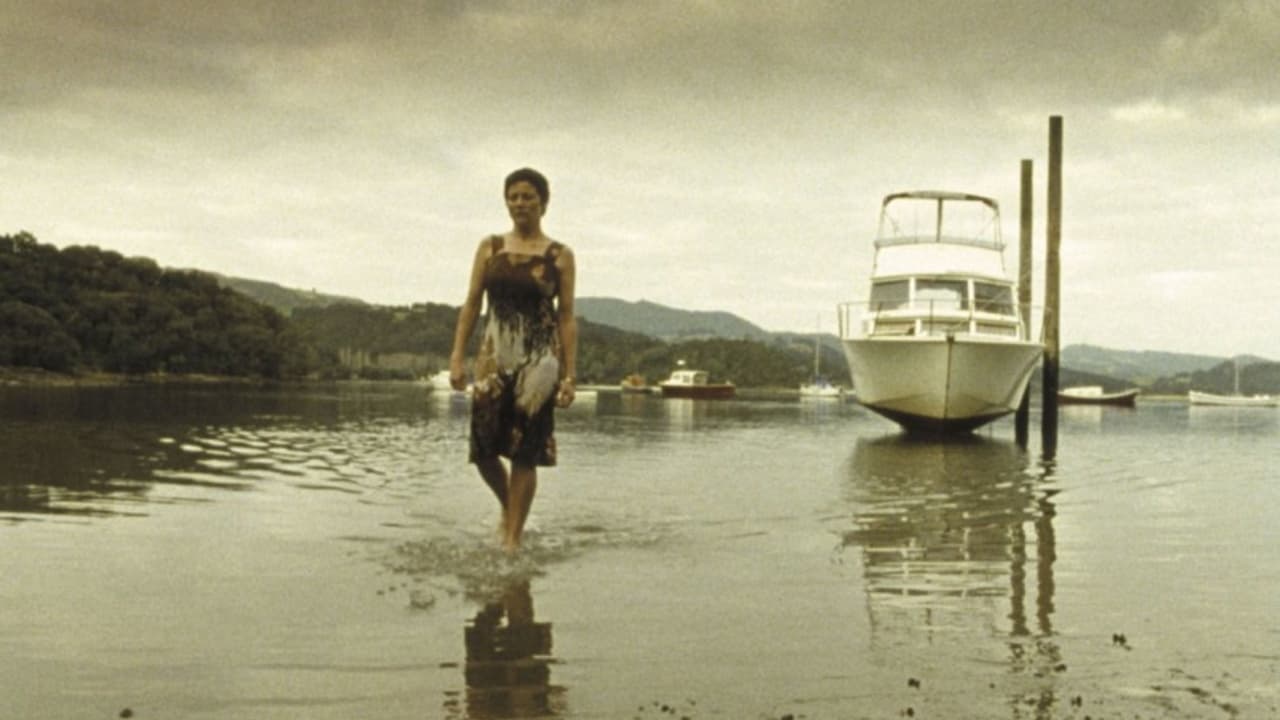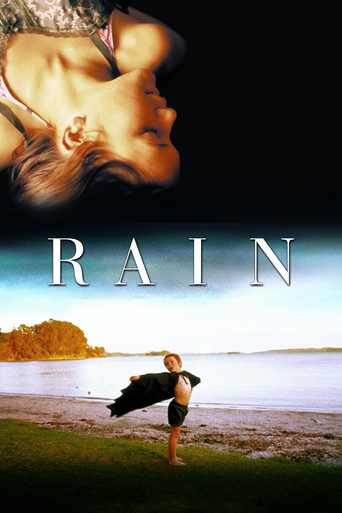

This is a must-see and one of the best documentaries - and films - of this year.
... View MoreIt really made me laugh, but for some moments I was tearing up because I could relate so much.
... View MoreExcellent and certainly provocative... If nothing else, the film is a real conversation starter.
... View MoreIt's a good bad... and worth a popcorn matinée. While it's easy to lament what could have been...
... View MoreMy initial thoughts whilst watching Christine Jeffs debut film 'Rain', were that the narrative crawled along at a pace far too slow for enjoyment. For a 92 minute film, there weren't a lot of obvious plot advances to keep me transfixed to the screen, or even that interested at all. The one thing that kept me watching was the beautiful cinematography of John Toon, and the stunning landscapes of New Zealand. The repeated use of photographically perfect sunsets and shots of the sea for most of the establishing shots throughout the film kept me wanting the current scene to end just so I could watch the next establishing shot.However, I was glad that I kept watching because I began to notice the more subtle side to the narrative, which I had at first, thought was missing altogether. Alicia Fulford-Wierzbicki's performance as the troubled 13 year old Janey starts off as a little unsure, but she seems to grow into the role throughout the film, until she becomes a character we can really feel connected to. Her portrayal of a young teenage girl struggling to cope with her journey into adolescence and new found sexual energy is incredibly moving, especially at the end when it leads to the death of her younger brother Jim. The performances of the rest of the cast I found to be not so powerful, but still effective in more subtle ways. Janey's dad, played by Alistair Browning, show's his feelings towards the breakdown of his marriage through small and relatively unnoticeable acts such as when he say's to his children 'because families do things together', whilst his wife is at home with a hangover.Another of this film's defining features is its careful use of non- diegetic music which really manages to capture the mood of each scene. The piano music that accompanies Kate's walk across the beach to Cady's boat starts off quite slow and relaxed, but builds up the closer she gets, like a mirror to Kate's emotions as she gets closer and closer to cheating on her husband. The acoustic song played over the scene where Janey finds Jim dead on the beach, is another example of just how useful getting the right song is, as it encapsulates most of the film into this one defining moment. It is that moment that, in my opinion, where this film crosses over the boundary of a simple coming of age film, into something else completely. In one instant, all the worries about Janey growing up and seducing Cady, Kate's affair with Cady, and the general breakdown of Kate and Ed's marriage, are put into a harsh perspective. Throughout the film, Jim plays a backseat role, not really impacting on the story significantly, and the rest of the characters end up neglecting him. We are reminded just how small and insignificant in the overall scheme of things that such worries are, and how when people get so caught up in their own lives and problems, that the little things, often the more important ones, can be overlooked, with tragic consequences.
... View MoreThis movie has a long, long line of events that prepare us for tragic ending. And it still comes unexpected, unless you've read the spoiler-containing comments.Having read other comments, I don't want to repeat what's been written. I'll share some thoughts about author's relation to characters, plot and year it happens.(IF YOU DON'T LIKE LONG COMMENTS SKIP THIS PARAGRAPH) First we notice that the director's relation to characters seems to be rather cold. We see a wife having a barely hidden affair and her husband not caring much. Is he used to, does he have affairs of his own, or he simply has no feelings for his wife any more, or maybe never even had? Or is this a kind of free love from flower-power? Is he resignated and waiting for the divorce, or is this situation convenient for him too? He can drink, stay home, go away, hang around with kids or ignore them and always have an excuse, he has a bad marriage. The parties these people take part night after night with their friends (turists as themselves) seem to be rather wild, with drinks, smoking, and maybe some drugs (I haven't noticed them, but...), wild enough that they (especially mother) need a lot of morning hours to recover (and prepare for next evening). During parties they swim nude, though they are not naturists (we never see them swim nude otherwise, even on such marvelous locations that simply lure for skinny-dipping - I can only dream to ever get there), so it is alcochol that rinses their inhibitions away. A girl, young teenager, has a few drinks, a few cigarettes, and her mother's reaction is weak, maybe just because she has an impression she should say something. But, being the one who is smoking and drinking and going alone with her lover, she knows she can't judge her daughter for following her steps. And the daughter goes forward, she chooses mother's lover to be her own as well. Is this the mother-daughter competition, the way daughter proves herself and builds her self-esteem, maybe trying to save her parent's marriage by taking mother's lover for herself or just imitating mother's behaving? We are left unanswered. (Btw, some people ask what happened between Janey and Cody. Did they watch some cut version, or do they really need an X-rated graphic version to understand what's going on?).After her brother's death there is an interesting, underestimated scene between mother and daughter. The girl blames herself for the accident, and mother comforts her. But this comfort is weak, inconclusive. It looks as if mother found a grain of consciousness but won't admit it and hopes for someone to say it's not her fault either. As they are rivals, both having an affair with same man, their guilt is equal, both were acting against the family. If they comfort and forgive each other, their own guilt will grow and they are not able to cope with it.The way all these events end gives us an answer why is the director on such a distance. She simply doesn't like any of the characters except the little child (as women often do), making him a victim to emphasize all the things she doesn't like in the world she is showing us. And she has no mercy and no understanding for any of these sinful adults.Just remember the last scene when the boy appears alive on the beach. He looks as if he knows it's all over, his world has collapsed, I can imagine this was the way children looked when they realized they'd be sacrificed to ancient pagan gods. This is a look that transfers a director's message: look what (and why!) happened to this cute kid, and most of viewers will agree, yes all those bad, bad people are guilty because of drinking, smoking, taking drugs, nude swimming, dancing, adultery, premarital sex, teenage sex, OK - sex in general; having headaches, pretending to have headaches, making photos, sailing, not sailing, going on holidays... well, doing anything amusing at all. It should all be forbidden to make the world better.Finally, why 1972? It seems as if the authors had some very bad experiences in 1970's and want to confront them. The basic plot could have happened in any period of history (even future), but the year looks to be carefully chosen, and none of the stereotypes people have about those years has been omitted. condemned After Manson "family" killed Sharon Tate and her guests four years before, making people realize the danger of drugs, Easy Rider was history in USA. Some (very) bad things in flower-power made people neglect positive sides of it. Few extreme situations were excuse for some people to terminate freedom movements, and plant a seed of paranoia that is blossoming today. Conclusion: the condemned life style led to L.A. murders, and it also led to Jim's death. We got analyzing the ten commandments one by one, then seven mortal sins, in more strict version than in ordinary churches (Pope John Paul II would forgive this sinners, and imams would maybe call back their fetvas, but there is no mercy from authors). The director must be a Saint herself. But if Christine Jeffs isn't Mother Theresa's pseudonym I can neither understand the authors nor feel sympathy for whatever happened to them in the 1970's.
... View MoreLike most of the other posters here, I loved Rain for most of the movie--no, it's nothing earth-shattering, but then, most coming-of-age stories aren't. The young lead does a great job portraying a somewhat cliched character (young girl who "seduces" older man because she feels boys her age are immature), giving her an amount of vehemence that is startling at times.Unfortunately, there's the ending which has already been mentioned, so I won't spoil it again. However, I will say that, with the current ending, it pretty much negates any importance the movie would have had. If the filmmaker's were adamant about keeping that part of the story, if that's what they thought was important, then I feel that the whole movie could have been done in ten minutes. In fact, I've seen several movies that begin where this movie leaves off. 2.5 out of 5 stars
... View Morethis movie had all the makings of a feel-good beach movie. set in new zealand in the 70's, it does a great job of making you feel relaxed, even sedated, as you watch a family's world turn upside-down. the key character is janey, a naive 13 year-old girl, but the real story is her parents and a marriage that is shaky at best. aside from the great direction and cast, ethereal camera-work, and a superb soundtrack, the real delight of this film is the part of jim, janey's little brother, who basically steals the show. a great film with a few good laughs that makes you feel good, despite a saddened ending.
... View More